
Taxonomic Data:

Description: Passion Flowers, belonging to the genus Passiflora, are renowned for their intricate and unique floral structures. Native to the Americas, these flowers are not only a visual treat but also have a rich history of medicinal use, especially in traditional remedies.
The name “Passion Flower” is derived from the Latin word “Passiflora,” which translates to “Passion Vine.” The flower was named in the 15th and 16th centuries by Spanish Christian missionaries who saw it as a symbol of the Passion of Christ. The various parts of the flower were seen to represent different aspects of the Passion, such as the three stigmas symbolizing the three nails used to nail Jesus to the cross, and the tendrils representing the whips used in the flagellation of Christ. The name was thus given to reflect the religious significance the missionaries attributed to the flower. The Passion Flower is not only known for its religious symbolism but also for its unique and intricate design, which has captivated people for centuries. For a more detailed history and other interesting facts about the Passion Flower, you can refer to Wikipedia.
Recipes:
Medicinal Benefits & Scientific Research: Passion Flowers have been traditionally used for their calming and sedative properties. They are often recommended as a natural remedy for anxiety, insomnia, and certain neurological disorders.
Passion Flower: A Natural Remedy
The Passion Flower, scientifically known as Passiflora incarnata, has been traditionally used for its medicinal properties across various cultures. Its therapeutic benefits range from calming the mind to alleviating physical discomfort.
Leaves and Stems: The leaves and stems of the Passion Flower are commonly used to prepare teas and tinctures. These preparations have been traditionally used to treat anxiety, insomnia, and nervous disorders. The calming effects of Passion Flower tea can be attributed to its flavonoids, which are believed to increase the levels of gamma-aminobutyric acid (GABA) in the brain. GABA reduces the activity of some brain cells, inducing a greater state of relaxation.
Flowers: The vibrant flowers of the Passion Flower plant are not just visually appealing but also have therapeutic properties. They are often used in combination with other herbs to enhance their calming effects. Some herbalists use Passion Flower flowers to treat symptoms of menopause, such as hot flashes and night sweats, due to their potential estrogenic activity.
Fruit (Passionfruit): While the fruit is more popularly consumed for its tangy taste and nutritional benefits, it also possesses mild sedative properties. In some cultures, passionfruit juice is consumed before bedtime to promote better sleep. The fruit is also rich in vitamins A and C, dietary fiber, and beneficial plant compounds, which can support overall health.
Roots: The roots of the Passion Flower have been traditionally used by indigenous tribes as a sedative and to treat various ailments. However, it’s essential to approach the use of roots with caution, as they can be potent.
Precautions: While Passion Flower is generally considered safe for most people, it’s essential to consult with a healthcare professional before using it, especially if you are pregnant, nursing, or taking medications. Some people might experience side effects like dizziness, confusion, or irregular muscle action and coordination.
Conclusion:
The Passion Flower is not just a visual marvel but also a reservoir of health benefits. Its therapeutic properties, combined with its delightful taste, make it a valuable addition to both our gardens and our diets.
© Gnomeprints 2021
Design by ThemeShift.